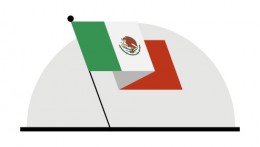1. Bulgaria
 Often regarded as one of the poorer European countries, Bulgaria has been earning a reputation as an attractive place for foreign companies to set up IT centres. These tend to be focused mostly on traditional software development for captive players such as CSC and SAP.
Often regarded as one of the poorer European countries, Bulgaria has been earning a reputation as an attractive place for foreign companies to set up IT centres. These tend to be focused mostly on traditional software development for captive players such as CSC and SAP.
However, one drawback, according to recent research by consultants A.T. Kearney, is that it has not yet implemented data security directives from the European Union, which may mean the country may not be suitable to handle sensitive customer information for clients with a European customer base.
It is ranked in ninth place in the consultancy group’s Global Services Location Index 2014, higher than any other nation in the same region. The annual index monitors financial attractiveness, people skills and availability among others.
Bulgaria is ranked 38th out of a 189 in the World Bank’s annual Ease of Doing Business Index 2016.
2. Brazil
 Brazil’s economy, currently the seventh largest in the world, is in pretty bad shape. Inflation is at a 12-year high, corporate profitability has slumped and consumers’ purchasing power has tumbled.
Brazil’s economy, currently the seventh largest in the world, is in pretty bad shape. Inflation is at a 12-year high, corporate profitability has slumped and consumers’ purchasing power has tumbled.
Moody’s, one of the big three credit rating agencies, is this year expecting a sharper recession than previously forecast of -2 per cent.
However, it appears Brazil’s worsening economic outlook and ongoing political turmoil hasn’t impacted its attractiveness as a global centre for outsourcing. It jumped from 12th place to eighth in A.T. Kearney’s Global Services Location Index 2014.
It described Brazil as a “software powerhouse” with several cities where global services operators should consider setting up shop, including Rio de Janeiro, Campinas, Curitiba, Porto Alegre and São Paulo.
3. Costa Rica
 It may be small with a population of fewer than five million people, but Costa Rica’s government has not let that prevent it from attracting overseas companies to set up offices in the rain-forested Central American country.
It may be small with a population of fewer than five million people, but Costa Rica’s government has not let that prevent it from attracting overseas companies to set up offices in the rain-forested Central American country.
The benefits are much greater than its size, according to Gartner, the market research company, with Costa Rica’s political environment considered to be the safest and the most stable of all the countries in the Americas, in its analysis of offshore destinations.
The World Economic Forum ranked it first in Latin America and 34th in the world for research and development collaboration between universities and industry, while PayScale found that it offers competitive labour rates for software engineers and programmers compared with other Latin American countries.
However, an area of weakness is its size and ability to scale its IT labour pool as Costa Rica’s IT services and sourcing industry grows, according to Gartner.
4. Czech Republic
 The Czech Republic is holding on to its title as a major player in outsourcing in Eastern Europe, with costs, including salaries, remaining competitive, although they are not the lowest in the region, according to research by Gartner.
The Czech Republic is holding on to its title as a major player in outsourcing in Eastern Europe, with costs, including salaries, remaining competitive, although they are not the lowest in the region, according to research by Gartner.
The market research group found that in locations, such as Prague and Brno, and increasingly in Ostrava, it is possible to find a wide variety of IT services skills, spanning a range of business process outsourcing competencies, a wide variety of application services and some infrastructure management capabilities.
It ranked 36th out of a 189 in the World Bank’s latest annual Ease of Doing Business Index and, the European Commission is forecasting, will record economic growth of 4.3 per cent this year and 2.2 per cent next year.
Accenture, Atos, CSC, Fujitsu, HP, IBM, Infosys, Tieto and T-Systems are among some of the companies that operate in the Czech Republic.
5. Egypt
 Egypt has had a difficult time over the past few years, with the Arab Spring and terrorist events in tourist destination Sharm el-Sheikh.
Egypt has had a difficult time over the past few years, with the Arab Spring and terrorist events in tourist destination Sharm el-Sheikh.
Nevertheless, National Outsourcing Association chief executive Kerry Hallard believes Egypt is looking in “good shape”, with costs remaining significantly lower than most nearshore destinations, while the graduate talent pool is high, and the domestic and regional markets are growing.
“Egypt has a population of 85 million of which 50 per cent is below the age of 25. There is a graduate pool of 500,000 and 49 per cent of the working population are in the services sector,” she says.
“Today Egypt has some 90,000 employees working in the sourcing sector of which 50,000 serve overseas markets. Language capabilities are high, Arabic being the mother tongue, but English is the business language that almost all graduates are fluent in.”
However, A.T. Kearney argues Egypt’s political instability is overshadowing its attractive IT outsourcing capabilities, although it believes that with recent investment in IT, Egypt has the elements to become a global player.
6. Hungary
 According to Gartner, it is possible to find a wide variety of IT services in Hungary, such as business process outsourcing and infrastructure management services, even if the country’s strength appears skewed toward application services.
According to Gartner, it is possible to find a wide variety of IT services in Hungary, such as business process outsourcing and infrastructure management services, even if the country’s strength appears skewed toward application services.
Service providers operating in Hungary include Atos, Epam, Getronics, HP, IBM, Neoris, Tata Consultancy Services, T-Systems and Unisys.
However, it still has the lowest level of foreign-language proficiency in the EU, although its government continues to invest in education. The corporate sector’s tax burden is high, compared with other European countries, but tax advantages for shared-service centres are available.
7. Malaysia
 A.T. Kearney believes Malaysia, which came in 18th place in the World Bank’s Ease of Doing Business Index 2016, has the potential to become a global player offering specialised IT service capabilities. It benefits from advanced English skills and cultural adaptability, which could put the country in a position to capture demand from both the UK and United States, once they expand their service offerings.
A.T. Kearney believes Malaysia, which came in 18th place in the World Bank’s Ease of Doing Business Index 2016, has the potential to become a global player offering specialised IT service capabilities. It benefits from advanced English skills and cultural adaptability, which could put the country in a position to capture demand from both the UK and United States, once they expand their service offerings.
In particular, it has a highly trained workforce, which will no doubt be viewed by foreign firms as an attractive asset. Outsourcing Malaysia estimates the country produces more than 135,000 graduates annually with bachelor degrees. Many of these will have knowledge of customer relationship management, facilities and administration, IT, and human resources services.
What’s more, according to National Association of Outsourcing, the country places high emphasis on education, with many students studying overseas at top institutions and returning with credible high-class degrees, giving Malaysia a large talent pool.
8. Mexico
 According to a report by A.T. Kearney, the global consultancy group, Mexico, alongside China, is starting to catch up with India as a major hub for IT outsourcing. In recent years, it has attracted US companies with its strong language skills, 500,000-strong IT workforce, its closeness to America as well as its time zone.
According to a report by A.T. Kearney, the global consultancy group, Mexico, alongside China, is starting to catch up with India as a major hub for IT outsourcing. In recent years, it has attracted US companies with its strong language skills, 500,000-strong IT workforce, its closeness to America as well as its time zone.
A.T. Kearney has ranked Mexico in fourth place out of 20 in its Rising Stars of IT Outsourcing Index, just behind India, China and Malaysia, and says the country has many hubs for the IT industry, notably Guadalajara, which has a big talent pool and low labour costs.
The consultancy says most US IT firms have already established delivery centres in Mexico, with HP and IBM the leaders, and while the Latin American nation’s labour cost arbitrage is not as large as India, for some buyers “proximity tilts the balance in Mexico’s favour”.
9. Portugal
 Portugal’s economy suffered greatly in the aftermath of the global downturn, leaving its government no choice but to go to the European authorities with its begging bowl and ask for a financial bailout to stay afloat.
Portugal’s economy suffered greatly in the aftermath of the global downturn, leaving its government no choice but to go to the European authorities with its begging bowl and ask for a financial bailout to stay afloat.
However, since then Portugal has made good progress and finally exited the bailout programme last year, although its unemployment rate is still high at around 12 per cent.
Gartner believes Portugal maintains an attractive position as a nearshore destination for providing IT services to clients in Europe and, to a certain extent, as an offshore location for Latin America. These companies are attracted by its strategic geographic location, a qualified talent pool and some multi-language capabilities.
“In fact, in a persistently challenged economic situation, multinational companies are capitalising on Portugal’s low wages and high level of unemployment to support call centres and customer service hotlines,” Gartner says.
10. Vietnam
 Vietnam has been named as one of the UK government’s trade arm’s 20 high-growth nations and economists believe it has huge potential in the long run.
Vietnam has been named as one of the UK government’s trade arm’s 20 high-growth nations and economists believe it has huge potential in the long run.
Notably, 60 per cent of its population of 90 million is aged under 30 and the Vietnamese authorities are working hard to create a broadly based and more highly skilled workforce.
This makes it a contender to become a major outsourcing destination in the future and, according to a recent report by accountancy firm KPMG, it is already considered an attractive destination for IT outsourcing services thanks to its young and well-trained workforce, competitive cost structure and stable business environment.
Around 98 per cent of respondents to the survey rated Vietnam as an attractive market for IT outsourcing business and indicated they will invest in expanding there.
The survey also found the labour force in Vietnam to be eager, hard-working and quick to adapt to technological change, although language skills seem to be a barrier.
1. Bulgaria

2. Brazil

